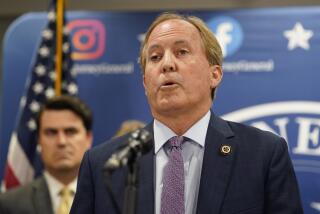Activists say poor nationsâ access to affordable drugs stymied
Reporting from Washington â Activists in the U.S., as well as Thailand and other developing countries, have accused the Obama administration of blocking greater access to affordable drugs in a bid to win the pharmaceutical companiesâ support for its healthcare overhaul.
Organizations such as Doctors Without Borders and Oxfam International -- an anti-poverty group -- said they had hoped President Obama would join them in the fight to make generic drugs available to combat disease in impoverished countries.
But âit appears that Obama appointees are continuing to work from the playbook of the last administration,â said Oxfam policy advisor Rohit Malpani. The British-based group had opposed President George W. Bushâs trade policies as being detrimental to public health.
Obama officials have rejected the criticism, saying that the president remained committed to the international health goals he embraced during the campaign and already had initiated trade policy changes.
And industry leaders pointed out that they had supported many programs to provide lower-cost drugs and contributed billions of dollars in medicines to poor countries. But, they said, aggressive enforcement of copyright rules was necessary to ensure the quality and safety of drugs, as well as to provide incentives for developing new medicines.
The issue was raised Wednesday during a State Department meeting that included members of the advocacy community and Obama administration officials. The activists said the conversation was cordial -- but not fulfilling.
Emi MacLean, an attorney for the New York-based Doctors Without Borders, said that âwe are still getting rhetorical commitments, but they are not matched by action.â
James Love of the group Knowledge Ecology International, who attended the meeting, said that in navigating the healthcare overhaul, the Obama administration had cozied up to the drug industry. He was referring in particular to trade representative reports released this spring on intellectual property enforcement.
âThe substance of these reports read as if they were written by a lobbyist for the pharmaceutical industry,â Love said. âIt is appalling, coming as it does from the Obama White House.â
Pharmaceutical companies are protected by patents that bar other firms from producing cheaper copies of their medications. But international treaties grant governments the right to override those patents when confronted with concerns over access to medicine. That exemption has been key in obtaining generic copies of crucially needed drugs in Thailand and other countries.
But tough talk from Washington about the importance of honoring drug patents, activists argued, could cause governments to forgo seeking lower-cost medicines.
For example, every year the U.S. trade representative produces a report on the state of intellectual property protection around the world. Sections of the 2009 report put Thailand on a âpriority watch listâ for poor patent enforcement and urged its government to address âpublic health challenges while maintaining a stable patent system.â
Activists said that language threatened to shake Thailandâs support for drug initiatives that are considered models for fighting epidemics in the developing world.
âThis [patent exemption] policy got real results,â said Kannikar Kijtiwatchakul, a university researcher in Bangkok who works with Doctors Without Borders. She said the number of Thai AIDS victims using a promising anti-retroviral drug had tripled to more than 50,000 after the government made a generic version available.
But Thailandâs actions brought complaints from pharmaceutical companies and the Bush administration that it had undermined the international patent system.
âWe had hoped for change,â Kijtiwatchakul said of the Obama administration, âbecause Mr. Obama . . . expressed support for the use of generic drugs. However, we now view the Obama administration as no different. . . . Access to treatment and essential medicines is not considered a high priority.â
Administration officials disputed the complaints, pointing out that the latest trade report had focused mostly on Thailandâs breach of counterfeiting and digital piracy rules.
âWe approach our trading partners, recognizing the public health needs in developing and least-developed countries as well as promoting a thriving global environment for innovation,â said Debbie Mesloh, a deputy assistant U.S. trade representative. âWe donât see these as mutually exclusive.â
But activists in Guatemala also said they were concerned that access to AIDS drugs was becoming more limited.
In the past, the drugs were available through a government initiative to buy them at a reduced price from international organizations -- a move opposed by the pharmaceutical companies and the U.S.
Recently, Guatemala has begun to pay market price for AIDS drugs, the activists said.
âThere really needs to be a course correction by the U.S,â said Ellen R. Shaffer, a co-director of the San Francisco-based Center for Policy Analysis, a health advocacy organization that has been studying the situation in Guatemala.
Shaffer acknowledged that the Obama administration had reduced its criticism of the Guatemalan government in the latest report. But, she said, âthat signal evidently hasnât been strong enough to stop the backward slide in Guatemala at the expense of peopleâs health. In effect, the Obama administration so far is stuck in the status quo.â
More to Read
Sign up for Essential California
The most important California stories and recommendations in your inbox every morning.
You may occasionally receive promotional content from the Los Angeles Times.










